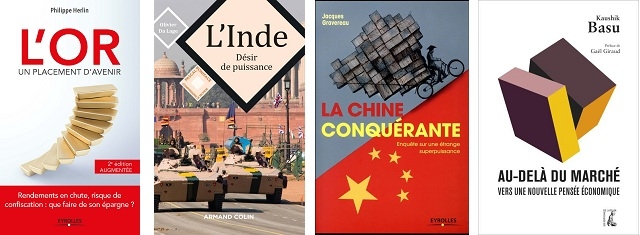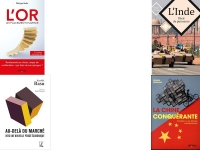Business
FOUR BOOKS About The Rising importance of Emerging Market Economies
Consumption, Investments and Environment

(Source: Eyrolles - Armand Colin - Atelier Editions)
USPA NEWS -
The rising importance of Emerging Market Economies will have in the coming years broad implications for the World´s allocation of consumption, investments and environmental resources. Vast consumer markets in the primary Emerging Market Economies will provide domestic and international businesses...
The rising importance of Emerging Market Economies will have in the coming years broad implications for the World´s allocation of consumption, investments and environmental resources. Vast consumer markets in the primary Emerging Market Economies will provide domestic and international businesses with many opportunities. Although income per capita will remain the highest in the world's developed economies, the growth rate in per capita income will be much higher in major emerging market nations such as China and India.
Emerging economies are catching up with the progress of the advanced world and are predicted to overtake many of them by 2020. This will cause a substantial shift in the global balance of economic power. As already noted, by some calculations, China is already ranked as the largest economy in the world. Many analysts foresee India surging in growth and taking over Japan´s place as the third largest economy in the world by 2020. Russian and Brazilian growth potential is great, as both countries are two of the world´s largest exporters of natural resources and energy...
- 'L'INDE - DESIR DE PUISSANCE' by Olivier Da Lage (India - Desire for Power - Armand Colin Editions). The Author is Editor in Chief for RFI and already wrote two books on INDIA... To summarize the Book : Prime Minister Narendra Modi´s call for India to become a leading power represents a change in how the country´s top political leadership conceives of its role in international politics. In Modi´s vision, a leading power is essentially a great power. However, India will only acquire this status when its economic foundations, its state institutions, and its military capabilities are truly robust. It will take concerted effort to reach this pinnacle.
Whether India becomes a great power depends on its ability to achieve multidimensional success in terms of improving its economic performance and wider regional integration, acquiring effective military capabilities for power projection coupled with wise policies for their use, and sustaining its democracy successfully by accommodating the diverse ambitions of its peoples.... (Review by Ruby BIRD)
- 'LA CHINE CONQUERANTE - Enquête sur une étrange puissance' by Jacques Gravereau (Conquering China - Investigation on a stranger superpower - Eyrolles Editions). The Author is considered as one of the best Expert on Contemporary Asia and on Globalization... When pressed for details, Chinese desire three things : more influence, more respect, and more space (China´s economic, political, and military power grows) While few in China question that the U.S. is still the sole world superpower, even fewer doubt that China is destined to surpass the U.S.... the only question is when. The Chinese foreign policy apparatus exudes confidence.
Essentially, China´s desired endgame begins with a China-dominated security arrangement in Asia in the short term and a China-led global power structure in the long term. China is willing to reward cooperative countries with economic prosperity, public goods, and practical benefits, but in return it demands respect, cooperation. Leadership requires China to fully embrace many common values and international norms as well as to demonstrate political courage. Its vision for a new global order is not shared by the U.S. and many countries in the Asia-Pacific region.... (Review by Ruby BIRD)
- 'AU-DELA DU MARCHE - Vers une nouvelle pensée économique' by Kaushik BASU (Beyond Market - Towards a new economic thought - Les Editions de l'Atelier). Kaushik Basu is an Indian economist and academic and currently professor of economics and the C. Marks Professor of International Studies at Cornell University. Before he was Senior Vice-President and Chief Economist of the World Bank.
Using analytic tools from mainstream economics, the book challenges some of the precepts and propositions of mainstream economics. It maintains that, by ignoring the role of culture and custom, traditional economics promotes the view that the current system is the only viable one, thereby serving the interests of those who do well by this system. By scrutinizing Adam Smith's theory, this impassioned critique of contemporary mainstream economics debunks traditional beliefs regarding best economic practices, self-interest, and the social good.
Kaushik Basu believes that good moral qualities are essential for growth and development within the economy. Honesty, trustworthiness and integrity are important qualities that need to be inculcated in an individual for personal development as well as within the society for development. Basu also feels the need to promote quality thinking in government and public debate... Kaushik Basu was the president of the Human Development and capabilities association founded by Amartya Sen which promotes high quality research in areas of human development and capability.... (Review by Ruby BIRD)
- 'L'OR - UN PLACEMENT D'AVENIR' by Philippe HERLIN (Gold - A promising Investment - Eyrolles Editions). The Author is developing the idea that from all the precious metals, gold is the most popular as an investment. Compared to other precious metals used for investment, gold has the most effective safe haven and hedging properties across a number of countries. Gold has been used throughout history as money and has been a relative standard for currency equivalents specific to economic regions or countries, until recent times.... Jewelry consistently accounts for over two-thirds of annual gold demand. India is the largest consumer in volume terms, accounting for 27% of demand in 2009, followed by China and the USA.
Industrial, dental and medical uses account for around 12% of gold demand. Gold has high thermal and electrical conductivity properties, along with a high resistance to corrosion and bacterial colonization. Given the fact that gold no longer backs the U.S. dollar (or other worldwide currencies for that matter) why is it still important today? The simple answer is that while gold is no longer in the forefront of everyday transactions, it is still important in the global economy. The reasons for gold's importance in the modern economy centers on the fact that it has successfully preserved wealth throughout thousands of generations. The same, however, cannot be said about paper-denominated currencies.... (Review by Ruby BIRD)
Armand Colin Eyrolles Philippe Herlin Olivier Da Lage Jacques Gravereau Kaushik Basu Market Gold China India Yasmina Beddou Ruby Bird Les Editions De L Atelier
Liability for this article lies with the author, who also holds the copyright. Editorial content from USPA may be quoted on other websites as long as the quote comprises no more than 5% of the entire text, is marked as such and the source is named (via hyperlink).






